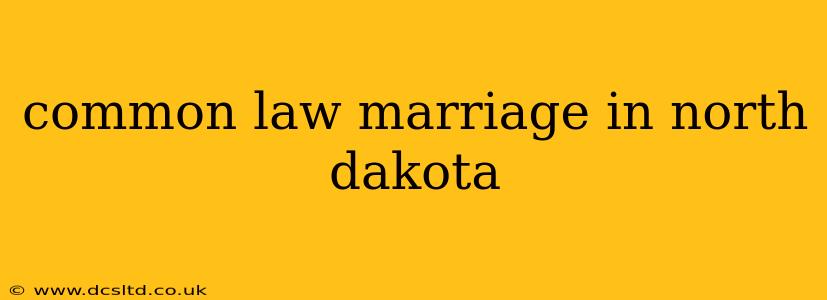North Dakota doesn't recognize common-law marriage. This means that simply living together for a prolonged period, sharing finances, or presenting yourselves as a married couple to others does not create a legally binding marriage in the state. To be legally married in North Dakota, you must obtain a marriage license and have a legally recognized marriage ceremony. This article will delve deeper into this topic, answering common questions surrounding common-law marriage and its absence in North Dakota.
Does North Dakota Recognize Common-Law Marriages Formed in Other States?
While North Dakota doesn't recognize common-law marriages formed within its borders, it generally will recognize valid common-law marriages formed in states where they are legally permitted. This recognition is crucial if a couple legally married under common-law in another state later moves to North Dakota. However, proving the existence of a valid common-law marriage from another state can be complex and often requires substantial evidence.
What Constitutes a Valid Marriage in North Dakota?
In North Dakota, a valid marriage requires:
- A valid marriage license: Obtained from the relevant county office before the ceremony.
- A legally performed ceremony: Officiated by a person authorized to perform marriages in North Dakota (e.g., clergy, judges).
- Compliance with all legal requirements: This includes aspects like age restrictions and proper documentation.
The absence of these elements means the relationship is not legally recognized as a marriage under North Dakota law, regardless of the length of time the couple has lived together or how they present themselves to others.
How Can I Prove a Common-Law Marriage from Another State in North Dakota?
Proving a common-law marriage from another state in North Dakota requires strong evidence demonstrating the couple intended to be married. This might include:
- Witness testimony: Statements from individuals who can attest to the couple presenting themselves as married.
- Joint financial records: Bank accounts, tax returns, and property deeds held jointly.
- Shared residence: Proof of cohabitation for an extended period.
- Affidavits: Sworn statements affirming the couple's intent to be married.
- Other documentation: Letters, photographs, or other documents supporting the claim.
The evidentiary burden rests heavily on the individuals claiming the common-law marriage. The court will carefully evaluate the evidence to determine if a valid common-law marriage existed in the other state.
What are the Legal Consequences of Not Being Legally Married in North Dakota?
Not being legally married in North Dakota has several legal ramifications, including:
- Lack of spousal rights and benefits: This includes inheritance rights, Social Security benefits, and healthcare decision-making authority.
- Difficulties in property division: In case of separation or death, the distribution of assets becomes significantly more complicated.
- Limited legal protections: Legal protections afforded to spouses under state and federal law are not applicable.
Therefore, obtaining a valid marriage license and undergoing a legal ceremony is essential to ensure legal recognition of the relationship and the associated rights and protections.
What if I lived with my Partner for Many Years in North Dakota?
Living together for a long period in North Dakota, even with shared finances and children, does not automatically grant you marital status. The only way to establish a legally recognized marriage in North Dakota is through a formal marriage license and ceremony. This is crucial for protecting both parties' legal rights and interests.
Disclaimer: This information is for general guidance only and does not constitute legal advice. For specific legal advice regarding your situation, consult with a qualified attorney in North Dakota.
